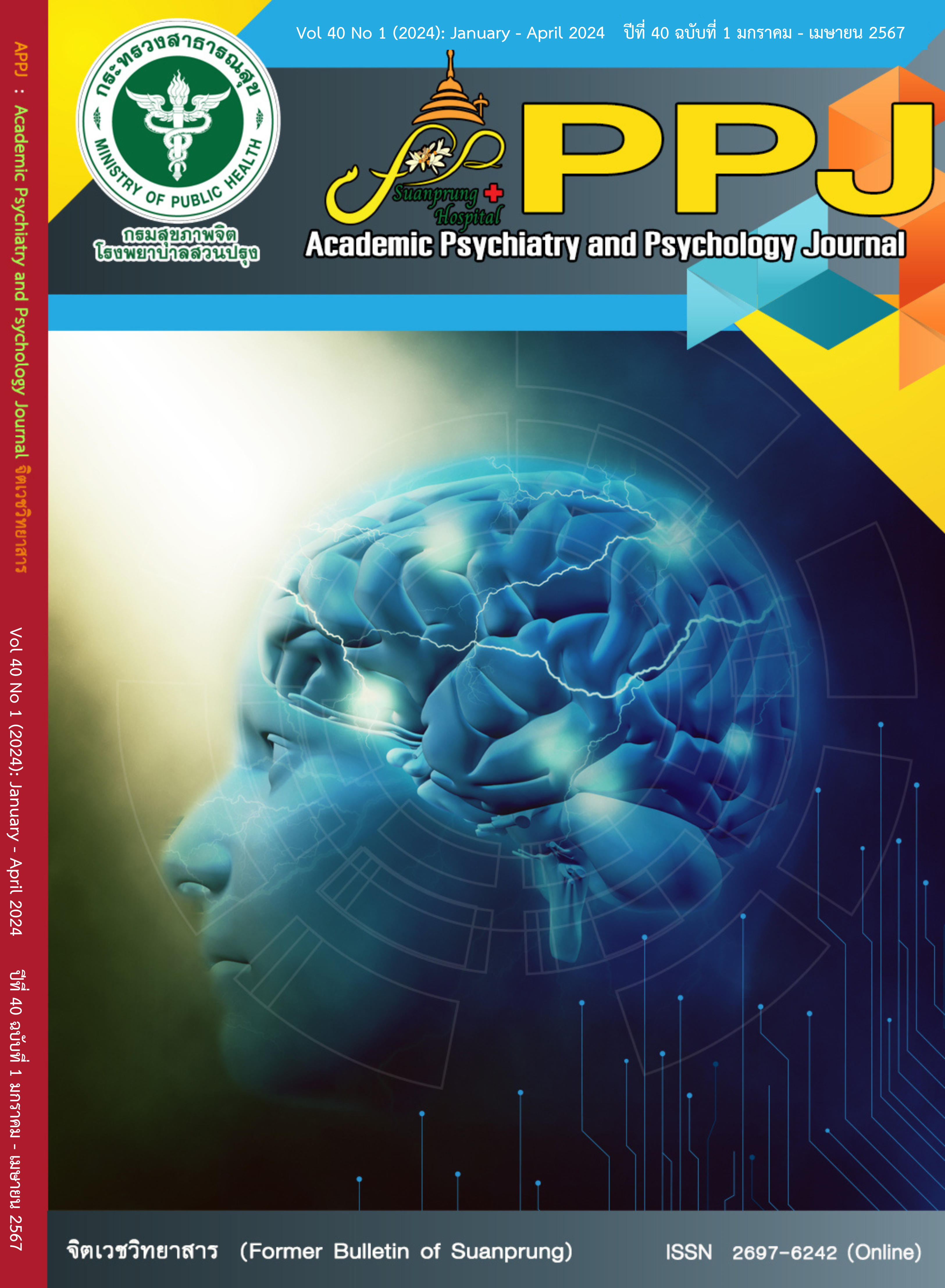การจัดการรายกรณีผู้ป่วยจิตเวชที่มีความเสี่ยงสูงต่อการก่อความรุนแรง : รายงานผู้ป่วย 1 ราย
Main Article Content
บทคัดย่อ
บทความนี้นำเสนอ การจัดการรายกรณีผู้ป่วยจิตเวชที่มีความเสี่ยงสูงต่อการก่อความรุนแรง 1 ราย ซึ่งผู้ป่วยรายนี้ ไม่มีผู้ดูแลหลัก ผู้ใหญ่บ้านดูแลประสานงานขอความช่วยเหลือ ชุมชนปฏิเสธผู้ป่วยเนื่องจากหวาดกลัว ประกอบกับบริบทโรงพยาบาลที่ดูแลผู้ป่วยรายนี้ไม่มีแพทย์เฉพาะทางด้านจิตเวช บทความนี้มีวัตถุประสงค์เพื่อนำเสนอการจัดการรายกรณีผู้ป่วยจิตเวชที่มีความเสี่ยงสูงต่อการก่อความรุนแรง ซึ่งเป็นผู้ป่วยมีปัญหาซับซ้อน โรงพยาบาลชุมชนมีข้อจำกัดในการให้บริการแบบเบ็ดเสร็จและแบบองค์รวม การประสานผู้เชี่ยวชาญกว่าในการให้การดูแลและภาคีเครือข่ายหลายภาคส่วน อันจะนำไปสู่การพัฒนาการดูแลอย่างต่อเนื่องต่อไป ซึ่งสามารถนำไปประยุกต์ใช้ในหน่วยงานอื่น ๆ ที่มีลักษณะเดียวกันได้ ผลของการบูรณาการการดูแลผู้ป่วยจิตเวชที่มีความเสี่ยงสูงต่อการก่อความรุนแรงรายนี้ ทำให้สามารถดูแลต่อเนื่องที่โรงพยาบาลชุมชนโดยมีภาคีเครือข่ายที่เกี่ยวข้องเข้ามาร่วมกันในการดูแล การวางแผน และการจัดการอย่างเป็นระบบ ผู้ป่วยไม่กลับมารักษาซ้ำตลอดระยะเวลาสองปีและไม่มีการก่อความรุนแรงซ้ำในชุมชน ผู้ป่วย ครอบครัว และทีมบุคลากรด้านสุขภาพพึงพอใจต่อการจัดการรายกรณีนี้
Article Details

อนุญาตภายใต้เงื่อนไข Creative Commons Attribution-NonCommercial-NoDerivatives 4.0 International License.
บทความหลังผ่านการปรับแก้จากกองบรรณาธิการแล้ว เป็นลิขสิทธ์ของวารสารจิตเวชวิทยาสาร โรงพยาบาลสวนปรุง กรมสุขภาพจิต กระทรวงสาธารณสุข ห้ามเผยแพร่เพื่อประโยชน์ทางการค้าโดยไม่ได้รับอนุญาต แต่อนุญาตให้เผยแพร่บทความดังกล่าวเพื่อประโยชน์ทางการศึกษาแก่ประชาชนทั่วไป ทั้งนี้กองบรรณาธิการไม่จำเป็นต้องเห็นด้วยกับบทความหรือข้อคิดเห็นใดๆ ที่ปรากฏในวารสารสวนปรุง
เอกสารอ้างอิง
Aiamsaart N, Thaweeses P, Chumchai P. The effect of case management to overall abilities
among schizophrenic patients with the risk for violence. Journal of Somdet Chaopraya Institute of Psychiatry. 2020; 14: 10-22. (in Thai).
Department of Mental Health. Serious Mental Illness with High Risk to Violence: SMI-V. 2023. Retrieved from http://data.go.th/dataset/smi-v-1-2558-28-2563.
Department of Mental Health. Handbook of care systems for psychiatric patients at high risk of violence for institutions and hospitals under the department of mental health. Nonthaburi: Prosperous Plus Company Limited; 2020. (in Thai).
Takviriyanun N. Nursing care of people receiving psychiatric drugs. Bangkok: Thammasat University Press 2015. (in Thai).
Maneeganon S, Arunponpaisal S, Pimpanit V, Jarassaeng N, Boontoch K. Prevalence of substance use in psychiatric outpatient clinic at srinagarind hospital. Journal of The Psychiatric Association of Thailand. 2014; 59: 371-80. (in Thai).
Srireunthong W, Kongsuk T, Sukhawaha S, Lodthanong S, Leejongpermpool J. Development of
violence severity scale in serious mental illness. Journal of The Psychiatric Association of
Thailand. 2016; 61: 253-66. (in Thai).
Gelkopf M, Lapid L, Werbeloff N, Levine SZ, Telem A, Zisman-Ilani Y, Roe D. A strengths-based case management service for people with serious mental illness in Israel: A randomized controlled trial. Psychiatry Res. 2016; 30: 241: 182-9.
Piboonarluk W, Yunibhand J, Pouwkantarakorn W, Unharasamee W. The Effect of Case Management by Advanced Practice Nurse on Relapse in Persons with Schizophrenia. Thai Journal of Nursing and Midwifery Practice. 2018; 5: 5-18. (in Thai).
Pragodpol P. Nursing Care Manager for Chronic Disease. Journal of Phrapokklao Nursing College. 2017; 28: 112-21. (in Thai).
Sindhu S. Case Management for High Cost Chronic Illness. 2nd ed. Bangkok: Wattana Printing 2018. (in Thai).
Panomsert C. The effect of case management on re-admission of schizophrenia patients at Surin Hospital. 2009; 24: 107-16. (in Thai).
Thadsri w. The Application of case management in complex schizophrenia patients: inpatient psychiatric ward, Surin hospital. Medical Journal of Srisaket Surin Burirum Hospitals. 2016; 25: 173-84. (in Thai).
Hemarat K, Siengchokyoo P, Khunarak U, Panasuna N. Effects of Case Management in Schizophrenic Patients on Medication Compliance and Relapse. The Journal of Psychiatric Nursing and Mental Health. 2012; 26: 63-73. (in Thai).
Chen M, Wu G, Wang Z, Yan J, Zhou J, Ding Y, Jiang Y, Rao S, Zhou Q, Ni H, Zhao J, Su Y, Hu J, Zhang Y, Yi Z, Yang W, Song L. Two-year prospective case-controlled study of a case management program for community-dwelling individuals with schizophrenia. Shanghai Arch Psychiatry. 2014; 26: 119-28.
Surapongpiwatana K. The Effect of Case Management: Hospital and Community-Based Model in Schizophrenic Patients. Medical Journal of Srisaket Surin Burirum Hospitals. 2016; 24: 111-19. (in Thai).
Jaroensan J, Chaichumni N. The development of psychosocial rehabilitation case management model for complicated schizophrenia patients. The Journal of Psychiatric Nursing and Mental Health. 2017; 31: 64-77. (in Thai).
Cheng J, Liu HC, Geng T, Wang Y, Yu L, Li JJ, et al. The Effect of Case Management for Schizophrenia Clients in China. Journal of Behavioral and Brain Science. 2020; 10: 297-310.
Sriharaksa P. Caring for schizophrenic patients at risk of violence through the use of participatory case management in the community Muang District, Sakon Nakhon Province: A case study of Khamin Subdistrict, Mueang District, Sakon Nakhon Province. Journal of Health and Environmental Education. 2023; 8: 436-47. (in Thai).
Case Management Society of America. Standards of practice for case management. Arkansas: CMSA, 2016.
Tangmanokun A, Chaiyasong S. Outcomes of Home Health Care in Patients with Schizophrenia by Multidisciplinary Team of Donmoddaeng District Health Service Network in Ubonratchathani. Journal of Health Systems Research. 2021; 15: 436-55.
(in Thai).
National Health Security Office. Manual care of chronic schizophrenia patients by the community for primary healthcare providers 2016. Bangkok: Saeng Chan Press Limited Partnership. (in Thai).

